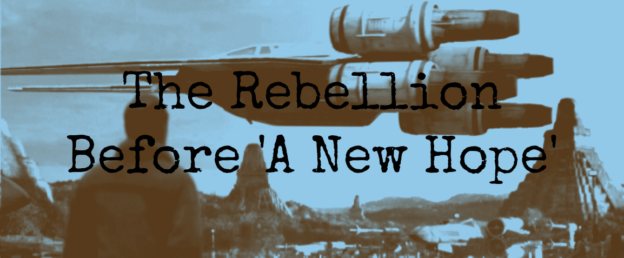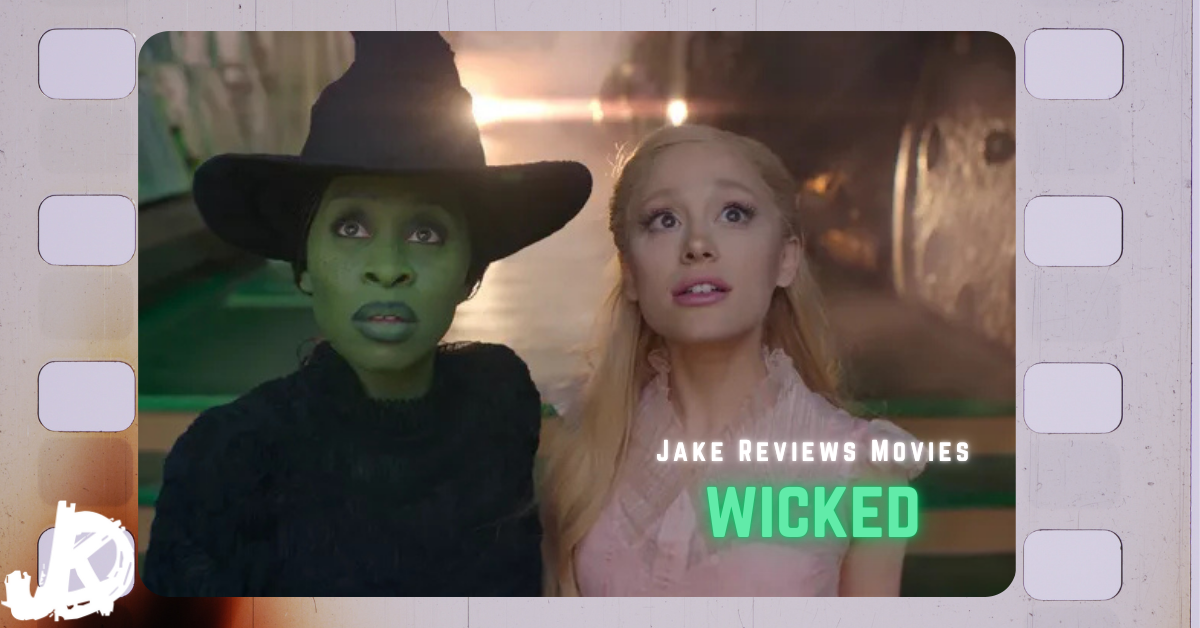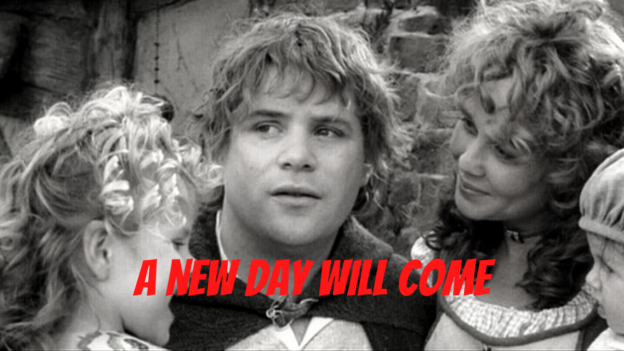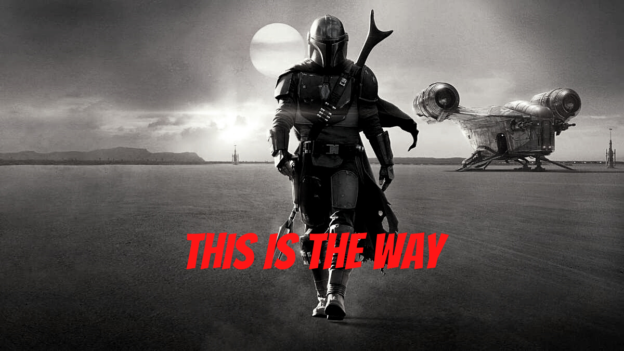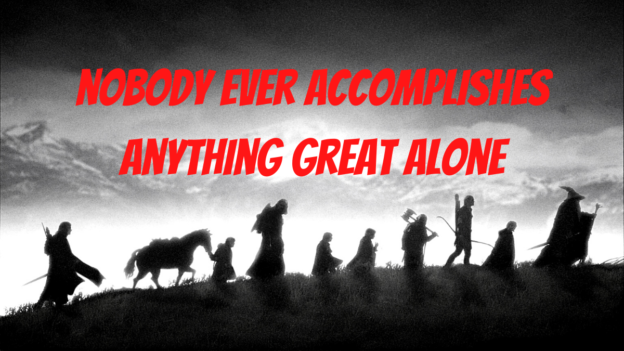I heard it said recently that Rogue One: A Star Wars story didn’t have an opening crawl because it was, in effect, the story behind the opening crawl of Episode IV: A New Hope. The “first victory” of the Rebellion over the Empire was the battle fought at Scarif. Scarif was the first in a series of events including Princess Leia’s capture, the destruction of Alderaan, and the battle of Yavin that marked the start of the Galactic Civil War. After Yavin, the Rebel Alliance was a primarily military group fighting an open war against the Empire. If you paid attention to Rogue One, HOWEVER, you may have noticed that this was not the case beforehand.
The Rebellion on the Political Stage
What tipped me off to this difference was the scene of Jyn Erso’s interrogation on Yavin-4. Mon Mothma told her that the Alliance wanted to bring her father, Galen, before the Imperial Senate to testify to the existence of the Empire’s rumored super-weapon. A few minutes later, Cassian Andor is told to just kill Galen instead. Apart from killing one of the brightest minds working for the Empire, Erso’s death gained the Alliance nothing. Instead they lost a potential witness. Even if Galen wouldn’t have made it in front of the Senate, the leaders of the Rebellion would have had something to report back. Because if there’s anything that screams unjust government, it’s a giant super-laser that can kill billions of people at once that you can shoot on a whim.
One of the classic scenes in A New Hope is a meeting of Imperial military commanders aboard the Death Star, bickering about how large of a threat the Rebel Alliance actually poses. One of admirals expresses concern that the Rebellion will continue to gain support in the Senate just when Grand Moff Tarkin enters the room, followed by Darth Vader, and announces that the Imperial Senate has just been dissolved. While this is a small detail in the plot of the film, for anyone paying attention to the political history of the galaxy this is HUGE. Even some of the guys at the meeting are skeptical.

The point I’m trying to make is that right up until Yavin, the galaxy still had a senate. Some of the big wigs of the Rebel Alliance—the people we saw arguing about what to do in response to the Death Star during Rogue One—were members or ex-members of the Imperial Senate who had the means of politics and diplomacy with which to push the Alliance’s agenda. The Senate just prior to its dissolution was an Imperial institution, but all the same it still functioned as a platform from which influential people could tout their opinions to a galaxy-wide audience. Even if the Emperor overruled what the Senate decided, the opinions of Senators carried a lot of weight. The Alliance to Restore the Republic, as it was known formally, was a political faction with significant clout in the Senate. Enough to make Imperial commanders nervous, and probably enough to give the Emperor incentive to dissolve one of the last remaining democratic bodies left behind after the Republic. So after the Senate was disbanded, there was no real outlet for the Alliance to use diplomacy. The dissolution of the Imperial Senate and the destruction of Alderaan must have made a few people in the galaxy realize that the Empire’s corruption was not going to benefit anyone except for the powerful few and brought more support to the Rebellion. But before then, any complaints against the Empire could be more easily dismissed.
We know from a series of deleted scenes shot for Revenge of the Sith that even before the Empire was declared, there were members of the Senate who distrusted Palpatine’s abuse of power. So once the Empire had taken control, those disaffected senators—Bail Organa and Mon Mothma among them—decided to take action to resist and eventually dismantle what they saw as an unjust government. The Empire had no limits on its authority—militarization, forced labor, unlimited resource consumption, and unlimited power to tax, seize property or citizens without question. It was an oppressive regime that more democratically-minded leaders in the galaxy would not stand for. They wanted change. But the Empire would prevent it.
I know what you’re thinking: I grew up watching the Prequels, so I have a higher tolerance for the politics of Star Wars. But if you think about it, the Original Trilogy is also about politics, though in a less heavy-handed way. Princess Leia fight with the rebellion because she believes that overthrowing the Empire is going to be better for the galaxy in the long run—the same reason Mon Mothma and Admiral Ackbar and others are there. While Han and Luke’s story arcs in the original trilogy are personal and spiritual, Leia’s is partly political. The Galactic Civil War was fought over who had the right to decide what would happen in the galaxy and how. The political details of Star Wars are what shaped the events in the lives of the characters.
Compromises for a Cause
Organa, Mothma, Ahsoka Tano, and other future Rebel leaders organized groups of paramilitary insurgents in different parts of the galaxy to intervene when the Empire did something they didn’t like. We get a taste for the activities of one of those cells from watching the first season of Star Wars Rebels. Rebels follows the adventures of a group from Lothal who regularly steal weapons from the Empire, defend and rescue the innocent from Imperial injustice, and provide welfare for the needy. By season two, the Rebel leadership has decided that some of these cells should band together to do these activities on a larger scale. But they’re not really fighting a war just yet. They have a few starfighters for general defense but not anything that’s supposed to take on the full Imperial military.

There were other independent groups in the galaxy standing up to the Empire, including Cham Syndulla on Ryloth and Saw Gerrera, who were not associated with the Alliance. I recently read Guardians of the Whills by Greg Rukka, which tells about Baze Malbus and Chirrut Imwe working with Saw’s insurgents for a time on Jedha. Saw’s campaign on Jedha damaged much of the local Imperial infrastructure, but the Empire strengthened its presence in Jedha in return, and there were a lot of civilian casualties in the fighting that erupted. Saw wanted to destroy the Empire at any cost, but the main core of Rebel leadership disapproved, and the Alliance distanced itself from Gererra.
I also had the vibe from Rogue One that the Rebellion also functioned kind of like a secret agency. Code names, covert missions, assassinations, and secret agendas are the order of the day. It’s cool if you love espionage thrillers in space, but Rogue One also highlighted that there was a dark side to some of this activity. Some of the people doing these things for the Alliance, such as Cassian Andor, had to do things we would usually consider immoral, because the security and survival of the Alliance came first. Stealing weapons to cause more havoc, killing stormtroopers and TIE pilots who are just doing their job, lying to the people they work with and work for to get things done, and undermining the established (though unjust) government. Do they necessarily like what they’re doing to overthrow the Empire? No. Cassian Andor says as much to Jyn when he puts together a team to go to Scarif in defiance of the Alliance council’s decision.

What’s more, these are the kinds of decisions that the leaders of the Rebellion have to make on a daily basis, particularly those who are still politically active. Bail Organa organized the Rebellion while still the senate representative for Alderaan—a planet noted for its pacifism, I might add. In public, he had to support the Empire in order to be a part of the political process. But he secretly built an organization to topple the Empire because he believed that the Empire was doing more harm for the people of the galaxy than good. I have made these points before, but I think we take them for granted.
Pursuing diplomatic solutions while encouraging the use of force to subvert the government. Speaking of peace when preparing for war. Working to preserve order on the other hand while dismantling it on the other. Bail’s subversion is hypocrisy, yes, from a certain point of view. Not something he believed should be an ideal for any leader. But the Empire had made things less than ideal. Bail Organa and Mon Mothma knew that a full-scale war with the Empire was inevitable, as much as they did not want it to happen. They knew that Cassian and Jyn were going to Scarif whether or not the council approved and they knew they were going to need all the help they could get. It needed to be done. The Rebellion did things that are inherently wrong, but it did them to depose an immoral government. The same goes for every revolution.

Princess Leia took Bail’s place in the Senate, and until Darth Vader arrested her, she was still a leading politician in the galaxy. And she did the exact same thing, serving as a representative in the Imperial government while secretly supporting the Rebellion. She still used the political process even if the Empire had rendered it ineffective. Because like her father, she still believed that it was worth the effort to bring about change through diplomacy. Fighting a war was the last resort for the Alliance when the Empire would no longer listen. They knew that diplomacy wasn’t going to work out, and it didn’t.
Leia’s birth mother Padme Amidala was the same way. When the Trade Federation invaded her homeworld, she went to Coruscant to petition the Senate for redress, but when that didn’t work out she took matters into her own hands. And then on Geonosis, Padme wanted to seek a diplomatic solution to the mounting crisis, but when she found that Count Dooku was unwilling to compromise, the time for talking was over. During the Clone Wars, Padme, Bail Organa, and a group of fellow senators did their best to minimize the war through diplomacy and occasional covert operations. Throwing an army at your problems is no way to solve it. It is individuals who choose to do the right thing who make the difference.
It also bears mentioning that in the deleted scene arc from Revenge of the Sith, Padme was not initially in favor of Bail and Mothma’s decision to stand up to the Chancellor. She thought it would lead to more political division and possibly more war. But after the group met with the Chancellor, she realized that he was not interested in a peaceful, democratic solution to the war. If you think she died of a broken heart just because of Anakin, think again: serving the Republic was her life. With the Empire’s new administration, the democratic process that she believed in and defended was gone.

Leia comes to the similar conclusion in Bloodline that the new Republic government will not provide the justice she thinks the galaxy deserves. Instead of dying, however, she decides to fight back. Hence the Resistance. The fandom likes to point out that starting a covert paramilitary group to administer vigilante justice is more like something Anakin would have done, but I think she got that idea from Bail.
Freedom for a Far-away Galaxy
When you think about it, the Rebels going to open war against the Empire was a huge step. When Jyn and Cassian returned to Yavin with news of the Death Star, a few members of the alliance council could only respond with panic. Logically, if the Empire had the means to destroy entire planets, then their fleet of spaceships would be useless. And then Bail speaks up, are we going to give up on something we’ve worked so hard to build? He and a lot of other people in that meeting have spent the last twenty years putting together a political-military force that can stop the Empire. They’ve been making every effort to remove the Empire. It’s pretty saddening to think that people just wanted to give up.
What Jyn says next is very insightful: scatter your fleet, and you doom the rest of the galaxy to an eternity of submission. If no one stood up to the Empire, then the Empire could take whatever it wanted. Going up against the Death Star with whatever fleet they did have? Yes, that would have been suicide. But going against the Imperial forces on Scarif to steal the Death Star plans? A reasonable chance. Analyzing those plans to find the trap that Galen Erso rigged? You’ve got a battle plan. Destroying the Death Star meant taking away the Empire’s means of controlling the galaxy.

Rogue One demonstrated that the line between revolution for the greater good and terrorism is extremely thin. The question is, where do you draw it? Depends on who and what you’re attacking. Do you throw your efforts indiscriminately at your enemy, do whatever it takes to irritate or destroy them? Or do you act with consideration for the value of life and fight in a way that will benefit as many people as possible?
If the galaxy is being ruled by an inflexible government that does not respond to the will of its citizens, then it might be necessary to make the hard choice to destroy that government. If the Empire is using weapons of mass destruction to kill innocent civilians, then find a way to destroy that weapon.

Only a handful of the pilots who went to Scarif to support the fleet survived to fight again at Yavin. Most of the pilots in the briefing room in A New Hope are new recruits like Luke. And we know that a lot of those pilots died. The volunteers who took their place in the ranks after Yavin? Most of them died in the years that followed. Leia observes sadly in Bloodline that the people who died fighting for a new Republic could have gone on to lead it, had they lived.
I just want to take a moment to say that war is ugly. It corrupts everything and everyone who takes part in it. Everyone loses. That doesn’t mean that the people who fight in wars aren’t good people, that they’re not fighting for a good cause. The people who go out and fight for whatever country you live in did all of that hard stuff, that bad stuff, so you could have a better life. So your children could have a better life. Think about that the next time there’s a patriotic holiday where you live.
(I’m sorry that was kind of a morbid post. I promise you my next Star Wars post will be more upbeat)

